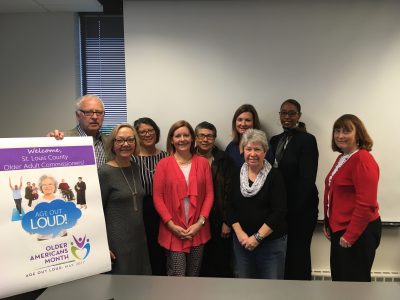Older Adult Commission



Older adult residents often have established roots within the community and may have lived in the community for a number of years. It is important to them that they are able to find meaningful ways to connect with other people and their government. Opportunities to stay active, connected, and serve their community have value both to the individual and the community as a whole.
A goal within the St. Louis County Age-Friendly Community Action Plan is to create opportunities for older adults to constructively engage with their local government in the creation of relevant policies and programs that support and address diversity in the older adult population. The creation of an older adult commission or board is one way to provide older adults the opportunity to engage with their municipality. In 2015, St. Louis County created the St. Louis County Older Adult Commission by ordinance, and the commission was filled in 2016.
Because St. Louis County recently created a commission, the process used and components included may be helpful to other communities who are interested in creating a similarly organized group for their community. The components list provides guidance on important elements to consider or include when creating an older adult commission.
APPOINTING AUTHORITY
The mayor, council or board will appoint your commission members. It is important that the appointing authority understand the purpose and roles of the commission. The appointing authority may also participate in the solicitation of applications to fill the commission. For St. Louis County, the County Executive is the appointing authority.
COMPOSITION
The members of the commission should include residents and be representative of the municipality geographically, as well as in age, gender, race, and socio-economic background. Adding at-large members, or members from a service agency or university, could also provide the commission with additional perspective or knowledge. Consider the mixture of stakeholders that will be most valuable in evaluating policies or programs for older adults.
PURPOSE/ADVISORY ROLE
The purpose of the commission should be clearly defined, and who the commission advises should be well thought out. Take time to clearly identify the role of the commission. Will they be providing guidance, making recommendations or reviewing programs/policies? Identify clear expectations and responsibilities for the group to provide structure and focus. This guides what the group may be able to change and influence.
MEETINGS
The ordinance should set an expectation for how many times the group convenes annually. It should also set parameters that provide structure for meeting procedures and decision-making.
STAFFING
Assign a municipal staff lead or Council/Board liaison to work with the newly created commission. This person will help the commission organize priorities, meetings, and reporting.
REPORTING
Reporting is an important piece of a commission’s work and responsibility to the municipality. Requiring the commission to reliably report on their work, recommendations, and efforts has two main benefits. First, it organizes the commission’s work and recommendations into something that the municipality can use when creating programs or policies for older adults. Second, it provides the commission a consistent, structured way to be a voice for older adults. Reporting helps to assess whether municipal policies and actions reflect the consideration of age-friendliness.
Main target group: Older people in general
Sector(s): Health, Housing, Information and communication, Transportation
Desired outcome for older people:
Learn, grow and make decisions